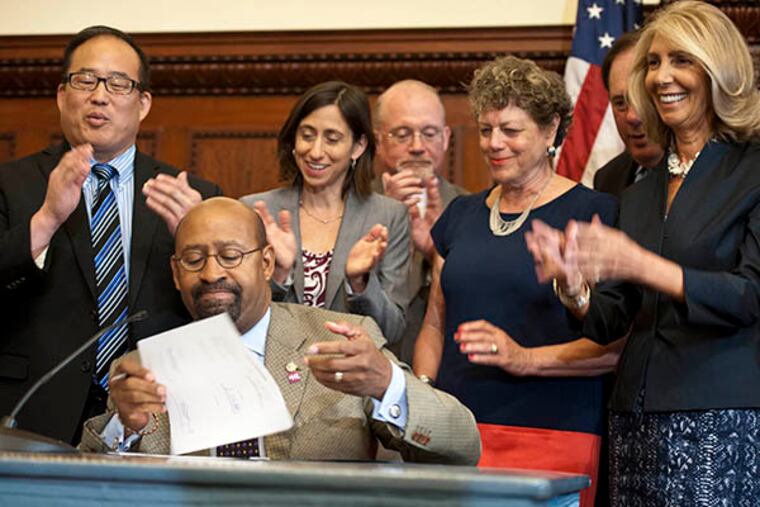Nutter signs bill extending mothers' rights on breast-feeding
Despite the well-established health benefits of breast-feeding for children, Philadelphia remains a laggard in its practice. Only 29 percent of the city's mothers are still breast-feeding six months after childbirth, according to Esther Chung, professor of pediatrics at Jefferson Medical College. That is the lowest rate among the nation's 10 largest cities, and 11 percentage points below the national average.

Despite the well-established health benefits of breast-feeding for children, Philadelphia remains a laggard in its practice.
Only 29 percent of the city's mothers are still breast-feeding six months after childbirth, according to Esther Chung, professor of pediatrics at Jefferson Medical College. That is the lowest rate among the nation's 10 largest cities, and 11 percentage points below the national average.
Wednesday, the city government took a small step to rectify those figures by mandating that employers provide breast-feeding employees a private, sanitary space and the necessary time to express breast milk.
The goal of City Council Bill 130992, unanimously passed by Council in June and signed into law by Mayor Nutter on Wednesday, is to remove one more impediment for women who want to breast-feed their children, but who do not have the luxury or desire not to work.
Now, under city code, it will be illegal "for any employer to fail to reasonably accommodate an individual's need to express breast milk."
"This bill," said City Councilman David Oh, who introduced the legislation, "addresses the issue of treating people fairly and on the merits. It's a constitutional right and it's smart. Success for women in the workplace is critical for Philadelphia to have a competitive economy. Women who are mothers should be able to be successful, happy, and fulfilled in the workplace."
According to Rue Landau, executive director of the Philadelphia Human Relations Commission, the law "adds essential job protections for working mothers and their families. . . . That's a huge win for female employees, their families, and Philadelphia's economy."
The importance of the legislation was highlighted during a hearing on the bill in June. According to testimony:
Women remain the primary or co-breadwinners in two of three Philadelphia households.
Breast-fed children suffer from fewer chronic ailments compared with those who are raised on baby formula.
Mothers who breast-feed miss less work as a result of time lost to doctors' visits for sick children. That translates to $3 saved by businesses for every $1 invested in providing space and time to allow breast milk to be expressed.
According to other testimony by advocates, many women give up on breast-feeding because they felt pressure from employers and, at times, coworkers not to express their breast milk while on the job. If breast milk is not regularly expressed when a baby is not available to feed, a woman's body will respond by shutting down milk production.
The new city legislation extends benefits that were given many women under President Obama's Affordable Care Act (ACA).
ACA, however, does not cover women who are employed in executive, administrative, or professional jobs.
The new ordinance covers all employees. It offers exemptions only to businesses that can show accommodation would cause "undue hardship." Businesses that do not comply face a $2,000 fine and compensatory damages.
"This has been a long time coming," JoAnne Fischer, executive director of the Maternity Care Coalition, told the large crowd of supporters who filled the mayor's reception room for the bill's signing.
"We are thrilled to know women in Philadelphia will have a new level of protection as they breast-feed their babies. This represents a major milestone in the lives of working families."
215-854-2594